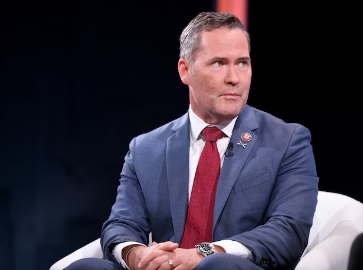
Alright, buckle up, patriots! Major news is breaking from the heart of the Trump White House, and you heard it here first – well, maybe not first first, but we’re breaking it down like nobody else! Multiple sources are confirming that two key players on President Trump’s National Security Council (NSC) are packing their bags and heading for the exits.
National Security Adviser Mike Waltz and his deputy, Alex Wong, are reportedly leaving their posts TODAY, Thursday! That’s right, a double departure at the very top of the administration’s national security apparatus.
Now, you know the drill with this White House – nothing is truly official until the President himself tweets it or announces it from the Oval Office. But the whispers are getting louder, and sources close to the situation say the moves are happening. We’re even hearing that Chief of Staff Susie Wiles is already in conversations with NSC staff about the transition. The White House hasn’t commented yet, which, honestly, is sometimes confirmation enough in this town!
Why the sudden shakeup? Let’s connect the dots…
This isn’t happening in a vacuum. Remember back in early April when at least six other NSC staffers were shown the door? That happened shortly after conservative firebrand Laura Loomer reportedly visited the Oval Office armed with “opposition research” targeting staffers she saw as “neoconservatives” or maybe, just maybe, not loyal enough to the President’s America First agenda. Could this be part of a broader effort to ensure absolute loyalty and alignment on the NSC?
And then there’s the elephant in the room surrounding Mike Waltz: the infamous Signal chat incident from March. You know the one – where Waltz accidentally added The Atlantic’s Jeffrey Goldberg to a seemingly secure chat discussing potential military strikes on Houthi targets in Yemen. Yikes!
Initially, only general details leaked, but when top officials like Defense Secretary Pete Hegseth, DNI Tulsi Gabbard, and CIA Director John Ratcliffe publicly denied classified info was shared, Goldberg dropped the really sensitive stuff, including strike timing and weapons used. Big oops!
Behind closed doors, Waltz reportedly admitted the reporting was accurate. There was serious debate in the White House about whether he should resign. But Waltz never offered, and importantly, President Trump didn’t ask him to leave at the time. In fact, Trump publicly stood by him, calling him “a good man” who “learned a lesson.”
So, why now? One source suggests the President feels enough time has passed since the Signal snafu that Waltz’s departure can be framed as a “reorganization” rather than a direct firing over the incident. It seems the President was hesitant to fire him immediately, perhaps not wanting it to look like he was caving to external pressure. This timing allows for a smoother narrative transition.
What about Alex Wong?
Waltz’s deputy, Alex Wong, is also leaving. Wong is a significant figure in his own right. He previously served in the first Trump administration, including a role as Deputy Special Representative for North Korea. President Trump himself credited Wong with helping negotiate his historic summit with Kim Jong Un. Wong declined to comment when reached, and we’re still waiting to hear from Waltz.
Who steps into these crucial roles? The Speculation Game Begins!
This is where it gets interesting. Replacing a National Security Adviser is a monumental decision. Who could be on deck?
- Sources say US envoy to the Middle East Steve Witkoff is unlikely for the top job.
- But the names circulating among Trump allies? How about White House deputy chief of staff Stephen Miller? Or perhaps British-Hungarian-American media host Seb Gorka? Why these names? Because they are seen as staunchly loyal and firmly behind the President’s core mission. Loyalty, it seems, is a key prerequisite.
- Ric Grenell, who served as Special Presidential Envoy for Special Missions, has reportedly said publicly he doesn’t want the post.
This move follows a pattern and signals a potential shift towards a National Security Council even more aligned with the President’s specific vision and less prone to perceived leaks or internal disagreements.
What does this mean for US foreign policy? What kind of advice will President Trump be getting now? And who will ultimately get the nod for National Security Adviser?
This is a developing story with massive implications for America’s standing in the world. Stay tuned!
What do YOU think about these departures? Share your thoughts in the comments below!







